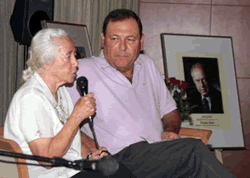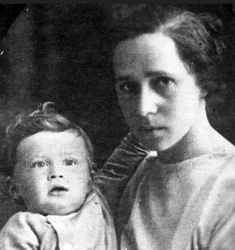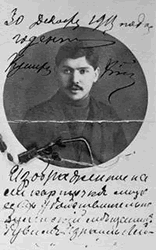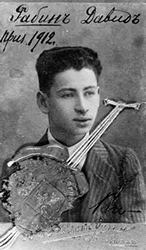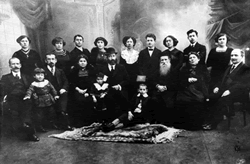Rabin Family
Click
on Photos to Enlarge
#rbn-1:
Rachel
#rbn-2:
Rosa Rabin
#rbn-3
From: lia ivanova <dorina-7878@mail.ru>
Date: Wed, Oct 1, 2014 at 6:05 PM
1912
My grandmother has the same picture of David Rubin son of Nisan -why?i know that Nisan was an uncle of my grandfather
#rbn-4
1912. David Rabin son of Nissan was my Grandfather from my mother side. He was murdered in Vilnius
Sept 1941 with his family (only my Mother survived because she left Vilnius the day the Nazis invaded Lithuania, June 22, 1941).
Michael Alfes <michael.alfes@gmail.com>
#rbn-5
of 1911 - Alfes-Rabin Families where David stands with
both arms crossed on the chest.
#rbn-6
#rbn-7
#rbn-8:
#rbn-9
#rbn-10
Yitzhak Rabin was born in Jerusalem in 1922 to Nehemiah and Rosa, two pioneers of the Third Aliyah. Nehemiah Rubitzov, born in a small Ukrainian town Smidowitz in 1886, lost his father when he was a child and worked to support his family from a young age. At the age of 18, he emigrated to the United States, where he joined the Poale Zion party and changed his surname to Rabin. In 1917, he went to the British Mandate of Palestine with a group of volunteers from the Jewish Legion. Rabin's mother, Rosa Cohen, was born in 1890 in Mogilev in Belarus. Her father, a rabbi, opposed the Zionism movement, but sent Rosa to a Christian high school for girls in Gomel, enabling her to acquire a broad general education. Early on, Rosa took an interest in political and social causes. In 1919, she sailed to the region on the S.S. Ruslan, the bellwether of the Third Aliyah. After working on a kibbutz on the shores of the Sea of Galilee, she moved to Jerusalem.[1]
Rabin grew up in Tel Aviv, where the family relocated when he was one year old. In 1940, he graduated with distinction from the Kadoori Agricultural High School and hoped to be an irrigation engineer.[2] However, apart from several courses in military strategy in the United Kingdom later on, he never pursued a degree.
Rabin married Leah Rabin (born Schlossberg) during the 1948 Arab-Israeli War. Leah Rabin was working at the time as a reporter for a Palmach newspaper. They had two children, Dalia and Yuval. Rabin was non-religious, with Dennis Ross remarking that Ross had never met a more secular Jew in Israel.[3]
[] Military career
[] Palmach
In 1941, during his practical training at kibbutz Ramat Yohanan, Rabin joined the Palmach section of the Haganah, under the influence of Yigal Allon. The first operation he participated in was assisting the allied invasion of Lebanon, then held by Vichy French forces (the same operation where Moshe Dayan lost his eye) in June-July 1941. After the end of the war the relationship between the Palmach and the British authorities became strained, especially with respect to the treatment of Jewish immigration. In October 1945 Rabin was in charge of planning and later successfully executing an operation for the liberation of interned immigrants from the Atlit detainee camp for Jewish illegal immigrants. In the Black Shabbat, a massive British operation against the leaders of the Jewish Establishment in the Land of Israel, Rabin was arrested and detained for five months. After his release he became the commander of the second Palmach battalion and rose to the position of Chief Operations Officer of the Palmach in October 1947.
[] IDF service
During the 1948 Arab-Israeli War Rabin directed Israeli operations in Jerusalem and fought the Egyptian army in the Negev. During the beginning of the war he was the commander of the Harel Brigade which fought on the road to Jerusalem from the coastal plain, including the Israeli "Burma Road", as well as many battles in Jerusalem, such as securing the southern side of the city by recapturing kibbutz Ramat Rachel.
During the First truce he participated in the altercation between the IDF and the Irgun on the beach of Tel Aviv as part of the Altalena Affair. In the following period he was the deputy commander of Operation Danny, during which the cities of Ramle and Lydda were captured, as well as the major airport in Lydda. Following the capture of the two towns there was an exodus of their Arab population and only a few hundred of the 50,000 to 70,000 residents remained[4].[4]
Operation Danny was the largest scale operation until then and it involved four IDF brigades. He was then Chief of Operations for the Southern Front and participated in the major battles ending the fighting there, including Operation Yoav and Operation Horev.
In the beginning of 1949 he was a member of the Israeli delegation to the armistice talks with Egypt that were held on the island of Rhodes. The result of the negotiations were the 1949 Armistice Agreements which ended the official hostilities of the 1948 Arab-Israeli War. Following the demobilization at the end of the war he was the most senior (former) member of the Palmach that remained in the IDF.
In 1964 he was appointed Chief of Staff of the Israel Defense Forces (IDF) by Levi Eshkol who replaced David Ben Gurion and, like him, served as Prime-Minister and Minister of Defense. Since Eshkol did not have much military experience, Rabin had a relatively free hand. Under his command, the IDF achieved victory over Egypt, Syria and Jordan in the Six-Day War in 1967. After the Old City of Jerusalem was captured by the IDF, Rabin was among the first to visit the Old City, and delivered a famous speech on Mount Scopus, at the Hebrew University. In the days leading up to the war, it was reported that Rabin suffered a nervous breakdown and was unable to function.[5] After this short hiatus, he resumed full command over the IDF.
[] Ambassador and Minister of Labour
Following his retirement from the IDF he became ambassador to the United States beginning in 1968, serving for five years. In this period the US became the major weapon supplier of Israel and in particular he managed to get the embargo on the F-4 Phantom fighter jets lifted. During the 1973 Yom Kippur war he served in no official capacity and in the elections held at the end of 1973 he was elected to the Knesset as a member of the Alignment. He was appointed Israeli Minister of Labour in March 1974 in Golda Meir's short-lived government.[6]
[edit] First term as Prime Minister
Following Golda Meir's resignation on April 1974, Rabin was elected party leader, after he defeated Shimon Peres. The rivalry between these two labor leaders remained fierce and they competed several times in the next two decades for the leadership role. Rabin succeeded Golda Meir as Prime Minister of Israel on 3 June 1974. This was a coalition government, including Ratz, the Independent Liberals, Progress and Development and the Arab List for Bedouins and Villagers. This arrangement, with a bare parliamentary majority, held for a few months and was one of the few periods in Israel's history where the religious parties were not part of the coalition. The National Religious Party joined the coalition on 30 October 1974 and Ratz left on the 6 November.
In foreign policy, the major development at the beginning of Rabin's term was the Sinai Interim Agreement between Israel and Egypt, signed on September 1, 1975. Both countries declared that the conflict between them and in the Middle East shall not be resolved by military force but by peaceful means [7]. This agreement followed Henry Kissinger's shuttle diplomacy and a threatened ‘reassessment’ of the United States’ regional policy and its relations with Israel. Rabin notes it was,”an innocent-sounding term that heralded one of the worst periods in American-Israeli relations.”[8] The agreement was an important step towards the Camp David Accords of 1978 and the peace treaty with Egypt signed in 1979.
Operation Entebbe was perhaps the most dramatic event during Rabin's first term of office. On his orders, the IDF performed a long-range undercover raid to rescue passengers of an airliner hijacked by militants belonging to the Popular Front for the Liberation of Palestine's Wadie Haddad faction and the German Revolutionary Cells (RZ), and had been brought to Idi Amin's Uganda. The operation was generally considered a tremendous success, and its spectacular character has made it the subject of much continued comment and study.
Towards the end of 1976 his coalition government with the religious parties suffered a crisis: a motion of no confidence had been brought by Agudat Israel over a breach of the Sabbath on an Israeli Air Force base when four F-15 jets were delivered from the US and the National Religious Party had abstained. Rabin dissolved his government and decided on new elections, which were to be held in May 1977. Meanwhile two unfortunate developments from his perspective occurred: following the March 1977 meeting between U.S. President Jimmy Carter and Rabin, Rabin publicly announced that the U.S. supported the Israeli idea of defensible borders. Carter then issued a clarification. A "fallout" in U.S./Israeli relations ensued. It is thought that the fallout contributed to the Israeli Labor Party defeat in the May 1977 elections [9]. The second development was the revelation that his wife, Leah, continued to hold a US dollar account from the days that Rabin was ambassador to the United States. According to Israeli currency regulations at the time, it was illegal for citizens to maintain foreign bank accounts without prior authorization. In the wake of this disclosure, Rabin handed in his resignation from the party leadership and candidacy for prime minister, an act that earned him praise as a responsible person and a man of integrity.
[] Opposition Knesset member and Minister of Defense
Following his resignation and Labor Party defeat at the elections, Likud's Menachem Begin was elected in 1977. Until 1984 Rabin was a member of Knesset and sat on the Foreign Affairs and Defense Committee. From 1984 to 1990, he served as Minister of Defense in several national unity governments led by prime ministers Yitzhak Shamir and Shimon Peres.
When Rabin came to office, Israeli troops were still deep in Lebanon. Rabin ordered their withdrawal to a "Security Zone" on the Lebanese side of the border. The South Lebanon Army was active in this zone, along with the Israeli Defence Forces.
When the first Intifada broke out, Rabin adopted harsh measures to stop the demonstrations, even authorizing the use of "Force, might and beatings," on the demonstrators.[10][11] Rabin the "bone breaker" was used as an International image.[12] The combination of the failure of the "Iron Fist" policy, Israel's deteriorating international image and Jordan cutting legal and administrative ties to the West Bank with the U.S.'s recognition of the PLO as the representative of the Palestinian people forced Rabin to seek an end to the violence though negotiation and dialogue with the PLO.[13][14]
In 1990 to 1992, Rabin again served as a Knesset member and sat on the Foreign Affairs and Defense Committee.
[] Second term as Prime Minister
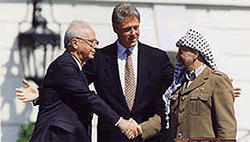
Yitzhak Rabin, Bill Clinton, and Yasser Arafat during the Oslo Accords on 13 September 1993
In 1992 Rabin was elected as chairman of the Labor Party, winning against Shimon Peres. In the elections that year his party, strongly focusing on the popularity of its leader, managed to win a clear victory over the Likud of incumbent Prime Minister Yitzhak Shamir. However the left-wing bloc in the Knesset only won an overall narrow majority, facilitated by the disqualification of small nationalist parties that did not manage to pass the electoral threshold. Rabin formed the first Labor-led government in fifteen years, supported by a coalition with Meretz, a left wing party, and Shas, a Mizrahi ultra-orthodox religious party.
Rabin played a leading role in the signing of the Oslo Accords, which created the Palestinian National Authority and granted it partial control over parts of the Gaza Strip and West Bank. Prior to the signing of the accords, Rabin received a letter from PLO Chairman Yasser Arafat renouncing violence and officially recognizing Israel, and on the same day, 9 September 1993, Rabin sent Arafat a letter officially recognizing the PLO. During this term of office, Rabin also oversaw the signing of the Israel-Jordan Treaty of Peace in 1994.
For his role in the creation of the Oslo Accords, Rabin was awarded the 1994 Nobel Peace Prize, along with Yasser Arafat and Shimon Peres.[15][16] The Accords greatly divided Israeli society, with some seeing Rabin as a hero for advancing the cause of peace and some seeing him as a traitor for giving away land rightfully belonging to Israel. Many Israelis on the right wing often blame him for Jewish deaths in terror attacks, attributing them to the Oslo agreements.
Rabin was also awarded the 1994 Ronald Reagan Freedom Award by the former president's wife, former First Lady Nancy Reagan. The award is only given to "those who have made monumental and lasting contributions to the cause of freedom worldwide," and who "embody President Reagan's lifelong belief that one man or woman truly can make a difference."[17]
[] Assassination and aftermath
Main article: Assassination of Yitzhak Rabin
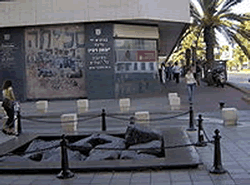
The monument marking the site of the assassination: Ibn Gabirol Street between the Tel Aviv City Hall and Gan Ha'ir
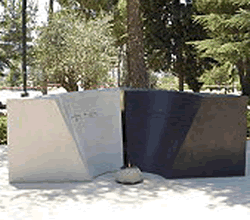
The grave of Yitzhak (right) and Leah Rabin (left) on Mount Herzl
On 4 November 1995 Rabin was assassinated by Yigal Amir, a radical right-wing Orthodox Jew who opposed the signing of the Oslo Accords and believed he was saving the country from a dire fate. The shooting took place in the evening as Rabin was leaving a mass rally in Tel Aviv in support of the Oslo process. Rabin was rushed to the nearby Ichilov Hospital, where he died on the operating table of blood loss and a punctured lung within 40 minutes.
After an emergency cabinet meeting, Israel's foreign minister, Shimon Peres was appointed as acting Israeli prime minister.[18]
The assassination of Rabin came as a great shock to the Israeli public and much of the rest of the world. Hundreds of thousands of grieving Israelis thronged the square where Rabin was assassinated to mourn his death. Young people, in particular, turned out in large numbers, lighting memorial candles and singing peace songs. Rabin's funeral was attended by many world leaders, among them U.S. president Bill Clinton, Egyptian president Hosni Mubarak and King Hussein of Jordan. Bill Clinton delivered an eulogy whose memorable final words were in Hebrew — "Shalom, Haver" (Hebrew: ???? ???, lit. Goodbye, Friend).[19][20]
Before leaving the stage on the night of the assassination, Rabin had been singing Shir LaShalom (literally Song for Peace), along with Israeli singer Miri Aloni. After he died, a sheet of paper with the lyrics was found in his pocket, stained with blood.
The square where he was assassinated, Kikar Malkhei Yisrael (Kings of Israel Square), was renamed Rabin Square. Streets and public institutions have been named after him all over the country. After his assassination, Rabin was hailed as a national symbol and came to embody the Israeli peace camp ethos, despite his military career and hawkish views earlier in life.[21] He is buried on Mount Herzl. In November 2000, his wife Leah died and was buried alongside him.
As with many political assassinations, there is much debate regarding the background of Rabin's assassination. There are a number of conspiracy theories related to the assassination of Rabin.
After Rabin's assassination, his daughter Dalia Rabin-Pelossof entered into politics and was elected to the Knesset in 1999 as part of the Centre Party. In 2001, she served as Israel's Deputy Minister of Defense.
[] Commemoration
The Knesset has set the 12th of Heshvan, the murder date according to the Hebrew calendar, as the official memorial day of Rabin. An unofficial but widely followed memorial date is November 4th, the date according to the Gregorian calendar.
In 1995 the Israeli Postal Authority issued a commemorative Rabin stamp.[22]
The Yitzhak Rabin Center was founded in 1997 by an act of the Knesset, to create "[a] Memorial Center for Perpetuating the Memory of Yitzhak Rabin." It carries out extensive commemorative and educational activities emphasizing the ways and means of democracy and peace.
Mechinat Rabin, an Israeli pre-army preparatory program for training recent high school graduates in leadership prior to their IDF service, was established in 1998.
Many cities and towns in Israel have named streets, neighborhoods, schools, bridges and parks after Rabin. Also two government office complexes and two synagogues are named after Yitzhak Rabin. Outside Israel, there are streets named after him in Bonn, Berlin and New York and parks in Rome and Lima. [23]
Reggae singer Alpha Blondy has recorded a single named 'Yitzhak Rabin' in memory of the Israeli prime minister.
1. Rosa ("Red") with son, Yizhak
2. Rachel Rabin Yaakov of Kibbutz Manara with Oded ben Ami.
News Release
________________________________________________________
The Hebrew University of Jerusalem ??????????? ?????? ????????
Sister of Yitzhak Rabin awarded Rothberg Prize
Jerusalem, June 7, 2009 - Rachel Rabin Yaakov ( wife of Raphi of Kibutz Manara), sister of the late Prime Minister Yitzhak Rabin, will be awarded the Samuel Rothberg Prize for Jewish Education by the Hebrew University of Jerusalem. The prize will be awarded to her today at the 72nd meeting of the Hebrew University Board of Governors.
According to Hebrew University President Prof. Menachem Magidor, the award is being presented to Ms. Rabin Yaakov for her work and wealth of public activities in the field of education.
For over six decades, Ms. Rabin Yaakov has developed and advanced the education system in her kibbutz, Manara, and in the north as a whole, and particularly in her work to absorb immigrant youth and integrate them into Israeli society.
The award is named after Mr. Sam Rothberg, who was one of the most devoted friends of the Hebrew University. A man of vision and action who contributed a great deal to the advancement of higher education, he initiated and contributed to the central establishment of research at the university and established the Rothberg International School, which he saw as being a center for encouraging aliya and as a means of strengthening Jewish identity in the Diaspora.
The prize will be awarded to Ms. Rabin Yaakov as part of the honorary doctorate awards ceremony at the opening session of the 72nd meeting of the Hebrew University of Jerusalem Board of Governors that will take place in the Rothberg Amphitheater on Mount Scopus at 5 p.m. on June 7, 2009.
Yuval Rabin is the son of Nobel Peace Prize winner Yitzchak Rabin, Prime Minister of Israel, who was assassinated in 1995 at a Peace Rally in Tel Aviv.
This was a turning point in the geopolitics of the region and has had massive repercussions in the Middle East and beyond. Yuval is here to commemorate the 10th anniversary of this tragic event. He will address Australian audiences on his father's legacy, his view on events that have unfolded since, and his personal journey as the son of one of the most powerful men in politics in our times.
Yuval Rabin is also a leader in his chosen field of technology in the United States. As Managing Partner with Rabin, Sheves, Lipkin-Shahak, Birger Inc., he has chosen to focus on bringing Israeli technologies into the U.S. Rabin has over twenty years' experience in software development, design and project management. He has held senior executive positions serving companies as diverse as AARP, The Principal Group, Visteon, Ericsson, Airbus Industries, Nokia, ARKLA (Arkansas Louisiana Gas), Samsung and the American Bureau of Shipping. Rabin truly espouses a global vision, having led initiatives for manufacturing and service companies, utilities and governments in the US, Israel, Europe and the Far East.
Prior to joining RSLB, Rabin was COO of BeyondGuide (a mobile content enabling company), where he spearheaded development of the company's business model and forged significant alliances with Europe's leading mobile carriers.
Yuval Rabin is a veteran of the Israel Defence Forces, having achieved the rank of major during his eight years of service, and is a graduate of the Israeli Army Computer Center training program. He resides in Washington
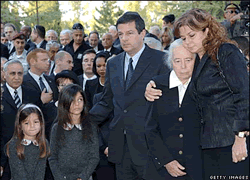
Yitzhak Rabin's children Yuval and Dalia, and the murdered prime minister's sister, Rachel Yaakov.
The road to Kibbutz Manara winds through lush green vegetation and
intoxicating views. At the entrance, you turn right and then
immediately left and drive along the fence. A few dozen meters down
the road, an old concrete building nestles amid pine trees and bushes.
This is where Rachel and Rafi Yaakov live in pastoral tranquillity.
The quiet can be deceiving, though. Lebanon is directly opposite the
house. Rachel says she learned how to send SMS messages to her
grandson, who saw action there in the last war.
In a tiny Formica kitchen with a rectangular window that frames the
view, a wooden table is set for breakfast - herbal tea from the
garden, homemade jam, butter and a basket of bread. Rafi is back from
his morning swim and the couple has just sat down to eat. It's Rafi's
86th birthday today.
More than 66 years ago, in March 1943, Rachel arrived with a group
from the Noar Haoved Vehalomed (Working and Studying Youth) movement
and graduates of the regional school in Kibbutz Givat Hashlosha at
this hilltop site of boulder-strewn land that the Jewish National Fund
had purchased. And she has been here ever since, viewing events from
high on the hill and from the elevation of her years, always suffused
with boundless optimism and vitality. She will soon turn 85. For
decades she was engaged in teaching and education. Every year, as the
anniversary of the assassination of her brother, Yitzhak Rabin,
approaches, she visits two or three schools to talk about him. This
week she spoke to a fifth-grade class in Binyamina, in the center of
the country. The pupils sent her the questions in advance.
Advertisement
She sat with the children and in a quiet voice told them about their
childhood, hers and her brother's, in 1920s and 1930s Tel Aviv; about
their parents who were busy with public activity in the city; about
the school for the children of workers, where there were no bells and
no homework; and about the stamp collection that ignited many fights
between her and Yitzhak. And they, the generation that collects
Pokemon, sat with mouths agape and drank in every word.
"They really took to the story about the stamps," she smiles. "I told
them that Yitzhak and I collected stamps. At first we quarreled, so we
split the collection. After that, we decided that it was no good being
alone, so we reunited the collection, but each of us wrote his name on
the back of every stamp so we would know, if we split it again, who
had brought what to the collection. That so much spoke to them. A
dialogue developed and each of them told how his grandmother or his
father also collected stamps. And I asked them what they collect.
"I told them that we also collected the gold and paper wrappings from
chocolates. Yitzhak loved chocolate. Back then there were chocolate
tablets made by the Fishinger company, which were wrapped in
illustrated paper. Yitzhak would eat the chocolate and I would get the
paper for my collection. One time, a friend of the family brought us a
pile of chocolates like that, and we opened them all straightaway and
took the wrappings. We put the chocolates in the cupboard. When my
mother opened the cupboard and saw the stacks of chocolate she got
angry and scolded us and said we were being pampered too much."
Feeling secure
Rosa, Yitzhak and Rachel's mother, who was known as "Red Rosa," was a
tempestuous revolutionary who died at 47, when Rachel was 12 and
Yitzhak 15. "The cloud of orphanhood accompanied me and Yitzhak for
many years," Rachel said this week. In a new biography, "Rabin: The
Growth of a Leader" (edited by Daniel Dor; Hebrew), the historian
Shaul Weber writes that for him, Rabin was a riddle; a man who
projected integrity and innocence but could resort to brute force, who
was surrounded by people but stood out as an emotionally alienated
loner, and who was able to externalize his feelings only in the last
years of his life. By poring over documents and interviewing childhood
friends, Weber looked for the answers in Rabin's boyhood, his youth
and his harsh test as the commander of the Harel Brigade in the War of
Independence.
The Tel Aviv of Rabin's childhood, in the 1920s and 1930s, was a
vibrant city economically and culturally and an arena of workers'
struggles. His parents, Rosa and Nehemiah, were leading activists in
the Labor movement. Nehemiah worked for the Israel Electric
Corporation and was a member of the trade union, while Rosa managed a
branch of the Loan and Savings Bank and devoted herself to extensive
public activity, which left little time for her small children.
Nehemiah Rabin seemed to be a family man. Childhood friends of his
son, now elderly women but then girls in his class, remember Nehemiah
sitting in a corner of the courtyard of their home and doing the
laundry on the washboard. The Rabin family lived in Spartan
conditions, with very modest furnishings in their home. But guests who
turned up unexpectedly knew they would have a place to stay. Many
meetings took place in the house, and the children sometimes fell
asleep in the beds of others. Loneliness was an integral part of
Yitzhak Rabin's childhood. His mother was often absent, particularly
during the nationalist disturbances of 1929. In such cases, Weber
writes, 7-year-old Yitzhak stayed in the house with his 4-year-old
sister. During summer vacations the children were sent to uncles and
aunts in Jerusalem. The most meaningful family experience was probably
the Friday evening ritual when the desk was pushed into the center of
the room and the four sat around it to partake of the Sabbath meal.
And the children?
"At first we lived on Shadal Street. When we were little there was a
nanny. When I started school, our parents made an agreement with the
neighbors, the Dissler family. He was a contractor and was about to
build on Hamagid Street. The idea was for him to build an apartment
with a shared passage and a shared kitchen. So we moved in next to
them, and this way the house was never empty. The Disslers were an
elderly couple, very nice, and they were always home."
Weber quotes your brother as saying on the radio program "My Father's
House" that he was a very lonely child.
"There was one thing that surprised me in that interview, that Yitzhak
spoke about feeling lonely when mother was still alive. I spoke to
Yitzhak about that. I told him it was very strange: 'You emphasize the
feeling of loneliness, but I never felt lonely.' We tried to
understand why this was so and very quickly realized that I had him
but that I apparently could not provide him with the same degree of
security as he provided me. And then the penny dropped and I
understood how much security he had given me over the years."
At what stage did you find yourself getting angry at your parents for
being so involved in their public activity and perhaps neglecting you
and Yitzhak?
"No, there was never anger. My parents never spoke in lofty terms
about values, but they lived according to a very clear scale of
values. They contributed to their fellow citizens and to the society.
There are things that are worth doing and worthy of investing your
time. Today we call it 'self-fulfillment,' but back then they just
said, 'Don't wait - do.'"
Basic and simple
Rachel was always the little sister who tagged along behind her big
brother. "I loved Yitzhak very much," she says. "I don't remember
myself without him. Our parents were always busy and he felt
responsible for me. I don't think mother and father asked him to do
that, but inwardly he always watched over me. I followed him
everywhere, to friends, and he never shooed me away. Hanna Rivlin, the
elder sister of [the poet] Haim Gouri, was in Yitzhak's class, and
when I tagged after Yitzhak, Hanna and another girl took me under
their wing. We are friends to this day. It was only at a later time,
when I myself was a mother, that I came to appreciate the patience he
showed toward me. How did he put up with me? The little sister who
trailed him everywhere.
"To the last day I felt that he was watching over me. He watched over
me from afar. For a person who lives in a place like Manara, political
and security decisions have practical translations in everyday life.
As long as Yitzhak was one of the decision-makers, for years, I was
calm. I knew that he was judicious, that he knew what he was doing. I
believed in his ability to decide things, from childhood until his
last day."
Weber describes a very modest home, even though your parents made a
good living. Did that bother you? Did it affect you?
"We had a table, chairs, beds. There were no carpets and I don't
remember any pictures. But there was everything we needed. We were one
of the first homes with an electric refrigerator, because Dad worked
for the electric corporation. From my point of view, we lacked for
nothing. Other children liked to play at our place, because there was
nothing that could be broken. There was also no key to the door and
all our friends knew where the candy jar was.
"Adaleh took a more critical view of our way of life. There were never
any luxuries. But really, what does a child need? There were table
games, like dominoes and chess, and most of the time we played
outside. Twice a year, ahead of Passover and Rosh Hashanah, we got new
clothes. The other children were envious of us, really, because our
mother didn't cook, so on school holidays, when there was no lunch,
Mom and Dad would leave Yitzhak and me money and we would eat at the
workers' restaurant on Brenner Street. Many times we were too lazy to
go that far, so we bought sour cream and bananas and a bowl of soup
nearby. Food was never a big deal."
The day before, Rachel relates, the children had asked her what
Yitzhak liked to eat. "I told them that we both liked basic, simple
food: bread, salad, an omelet. Yitzhak was very fond of apples and
olives. Yitzhak's secretary in the bureau told me that when he became
prime minister, the staff noticed that he didn't go out to eat. One
day the secretary asked him if she should make him something to eat.
He said, 'If you can make me the same thing they made in the Defense
Ministry, I will be pleased.' 'And what did they make for you?' she
asked. 'Sour cream with cucumbers,' he said."
For decades, Rachel Rabin was involved in education. She taught the
first class in Manara. Afterward she was a teacher in the elementary
school that was established in the kibbutz and one of the founders of
the regional school in Kibbutz Dafna, where she taught biology. In
recent years she has coordinated the graduation projects in grades 11
and 12. Education and children are her abiding loves.
Like her brother, she attended Beit Hinuch, a school for workers'
children in Tel Aviv. The school day lasted until the afternoon and
the children ate lunch there, which they cooked for themselves. The
goal was to provide a labor-socialist education: responsibility and
self-discipline within a democratic framework. In practice, the
framework was quite loose. There was no regular schedule and classes
began and ended as the teachers saw fit. There was no homework and no
grades were given. The children took part in managing the school; many
issues were decided in pupils' assemblies.
The school consisted of four meager cabins, but for the children it
was paradise. The anarchy came to an end when the admired teacher and
pedagogue Eliezer Smoli entered the classroom in fourth grade.
Appalled by the ignorance he encountered, he sent the children home to
study the multiplication tables in the company of their parents. This,
he hoped, would induce the busy parents to take some responsibility
for their children's education. Yitzhak Rabin, by the way, did not
start to read and write until fourth grade.
"Yesterday," his sister relates, "I told the children in Binyamina
that there was no school bell and that when the lesson ended we went
quietly for recess. There were no tests, either. They were astonished.
The values we received in Beit Hinuch accompanied us throughout life:
Zionism, social justice, caring for others and love of the country.
You know, we were small children and there were no buses like today,
but we were taken on outings all over the country. We learned about
relating to nature and relating to work. The slogan in the school was
'Work and learn.' And we worked: There was a garden where we grew
vegetables, and we cooked our own meals. We worked in rotation in the
kitchen and we washed dishes and laundered the aprons. We worked in
the carpentry shop. There was a bookshelf at home that I built in the
carpentry shop. There was a sheep, beehives, even a mule. Yitzhak was
in charge of the mule."
Eliezer Smoli had a formative influence on Yitzhak Rabin's
personality. In his autobiography, Rabin thanked the iconic teacher
who had pulled him out of his loneliness and taught him how to
experience the feeling of "being together." A thread that runs through
Weber's book is the social hardships of the young Rabin. In this
period he did not stand out and was quite reticent, but he excelled at
sports and won acclaim on the soccer field. The girls called him
"burik" - beet - because he would blush when they tried to befriend
him. In circle dances there was no one who could make him join in.
As an educator, and as the recipient of a socialist-democratic
education, what do you think of today's youth?
"Last week I received the 'Rabin pre-army course' group in the
kibbutz: 70 young people doing a year of national service before the
army. I showed them around and told them how we had established the
kibbutz. Wonderful youth. But who knows about them? Who hears about
them? We put on the television and hear about murder and rape and
robbery and corruption and fraud. Like Rafi says, you open the paper
and all you see is black on white. I think people should see the good
and beautiful things we have in this country, that people should have
hope. They are also my hope."
Still, it's hard to ignore what's happening in the education system:
the violence in the schools, the deteriorating status of teachers.
"There are schools that have overcome the violence. If there is
consciousness of it, it can be overcome. It's not easy, because our
surroundings are violent. Speech is violent. Speech on television is
violent. The violence begins from above, and the basic values of
tolerance, accepting those who are different and mutual respect no
longer remain. An officer to whose unit I gave a talk told me that it
was easier for our generation, because we had educational models. That
is true. We had teachers of stature, we had youth movement leaders
with an ideology. That is lacking.
What is your opinion of government corruption and the wastefulness at
the top? Just last week, we read about [Labor Party leader Ehud]
Barak's luxury hotel suite in Paris.
'It is terrible. It makes me feel terrible. I think there is no shame
left today. In the affair of the bank account held by Yitzhak and [his
wife] Leah abroad, Yitzhak resigned. On the one hand, I held him in
very high regard for that. But on the other hand, I thought it wasn't
right. Why did he resign? And I am not making comparisons with today.
It was their money, which they had earned. True, under the law they
were supposed to transfer all the money to Israel. But Yitzhak took
responsibility. He did not blame it on Leah. And rightly so. He said
that if she were placed on trial, he would resign. Today, though, I
see that there is no shame and no responsibility."
His own person
In her extensive public activity, Rosa Rabin ignored her poor health.
She had a heart ailment and a few years before her death also fell ill
with cancer. Her illness heightened young Yitzhak's sense of
responsibility and injected a feeling of anxiety into his life. "There
was a great deal of concern," Rachel says. "Yitzhak worried more about
mother than I did. Many times he ran to call the doctor."
In the summer of 1934, when Rachel's parents went to a spa in
Marienbad, in Czechoslovakia, Rachel was left with a friend at Kibbutz
Yagur. Weber notes that Yitzhak, a boy of 12, was left alone at home.
(Rachel said this week that he also visited relatives in Jerusalem.)
It was also in 1934 that he completed elementary school, which led to
a serious dilemma at home.
Nehemiah wanted his son to attend the Gymnasia Herzliya school in Tel
Aviv, which was considered an elitist institution; Rosa wanted him to
continue on the track of schooling for workers of the land in a
socialist spirit - and because no such school existed in the area, she
decided to found one.
Rachel, who was by then attending the school in Givat Hashlosha,
continued her studies after her mother's death, but now as a live-in
student, and afterward went to Kibbutz Tel-Hai in Upper Galilee for
land-settlement training.
"In 1942, the JNF bought the lands at Manara and we arrived in January
1943. There was nothing here. Not even trees. The trees had been cut
down many years before and nothing grew, because the Arabs came with
their flocks for grazing, which decimated anything that tried to grow
anew. We proceeded very slowly. It was very hard. We had great belief.
This was our dream. And many left along the way."
Two years later, she relates, Rafi arrived. "He immigrated from
Germany - he managed to escape in 1939. Yitzhak and I were married
three days apart: first Rafi and me, then Yitzhak and Leah. We took
advantage of a truce in the War of Independence. Both weddings were
modest. The guests at my wedding were Rafi's parents and my father.
Yitzhak couldn't get there. But the group from the Palmach [commandos]
wouldn't let Yitzhak and Leah - who served at Palmach headquarters -
off so easily. They weren't going to pass up the opportunity for a
party after all the pain and losses in the war. They held the wedding
in a small hall in a hotel."
Powerful longings
The telephone rings nonstop, as the children, the daughters-in-law and
the grandchildren call to congratulate Rafi on his birthday. The
Yaakovs have three children - Tirza, the eldest, born in 1950, and two
sons, Yiftah and Gadi. Rachel and Rafi also adopted Binya (Binyamin)
Jedidi as another son. He was killed in the 1973 Yom Kippur War. They
consider his children full-fledged grandchildren. Most of the
grandchildren, who number 11, have already completed their army
service. "We are all very much attached," Rachel says. On Friday they
will all meet for a festive meal to celebrate Rafi's birthday.
Yiftah, she says, was seriously wounded in the battle of the "Chinese
Farm" in the Yom Kippur War. "He was a tank commander, and they barely
got him out of that hell. He was very badly hurt - broken and burned
and torn. He spent four and a half months in hospital. He was wounded
while rescuing another tank crew. He was in the turret and took a
direct hit and was thrown from the tank. His replacement was Bertie
Ohayon, who today retired as the police operations commander. The
bodies and wounded of the Egyptians and of our boys were strewn there.
Bertie went from one to the next and asked, 'Are you a Jew? A Jew?'
When he got to Yiftah, he replied, 'I am a Jew, but it's hard to be a
Jew.' Bertie pulled him out of there. One hundred and twenty of our
boys were killed there that night."
Were you worried about Yitzhak?
"I was worried about him all my life. There was some sort of telepathy
between us. It's a strange story. Yitzhak was injured in a motorcycle
accident. [The accident occurred in December 1945, when Rabin was on
the way to prepare a demolition operation at the Jenin police
station.] I was already in Manara. The mail came to Kfar Giladi and
someone rode a donkey down to the village to pick it up. That morning,
I told a girlfriend that I had a feeling something had happened to
Yitzhak. She said, 'Stop it. Why are you putting things into your
head?' Around the middle of the day I was told that the fellow who
brought the mail was looking for me. I went to him and straight off
said, 'What happened to Yitzhak?' I already knew.
"During the battles in the War of Independence, my father was very
worried. Yitzhak was in Jerusalem and I was under siege in Manara. One
day he told Yitzhak how concerned he was, and Yitzhak said, 'Why are
you worried? You know that I am in Jerusalem. You also know that
Rachel is in Manara. What will the parents who don't know where there
children are say?'"
Were you also worried before the assassination?
"I was terribly afraid. Terribly afraid. I thought he was not being
guarded well enough."
Did you tell him?
Where were you when it happened?
"I was here. We watched the rally on television. Then we heard that
there had been shots and that the prime minister had been hit. I
called all the numbers I had. No one answered any of them. I called
Ichilov [Hospital] and asked for Eitan [Haber, Rabin's close aide].
'Eitan, what happened?' I asked him. He said, 'I'm not going to
pretend, get here as fast as you can.' We left immediately. On the way
we heard that he had died."
Do you miss him?
"Very much. The strongest feeling is the longings."
"I sat next to him during the whole flight," she says. "In his speech
upon receiving the prize, he spoke quite a bit about the cemeteries
and about the fallen he had left behind. That spoke to me very
powerfully. The next morning, Amos Horev [a retired major general],
who had also been invited, asked me, 'Why did Yitzhak have to talk so
much about cemeteries?' I did not reply.
"A harrowing conversation developed between us. Lucy opened up and
told me about her younger son who was killed. I told her that I knew
the details but hadn't made the connection. At home, I told my son
about Marnin, and he said that her son had been a soldier under his
command and that of course he had known him personally.
"In Oslo, while I looked at Yitzhak, I thought to myself about what
our parents would have said if they could have seen him on this
occasion. I went over to him and said, 'You know, I want to thank you
very much for inviting me.' He brushed it off with a gesture of his
hand, as usual, and said, 'Forget it, it goes without saying.'" W
